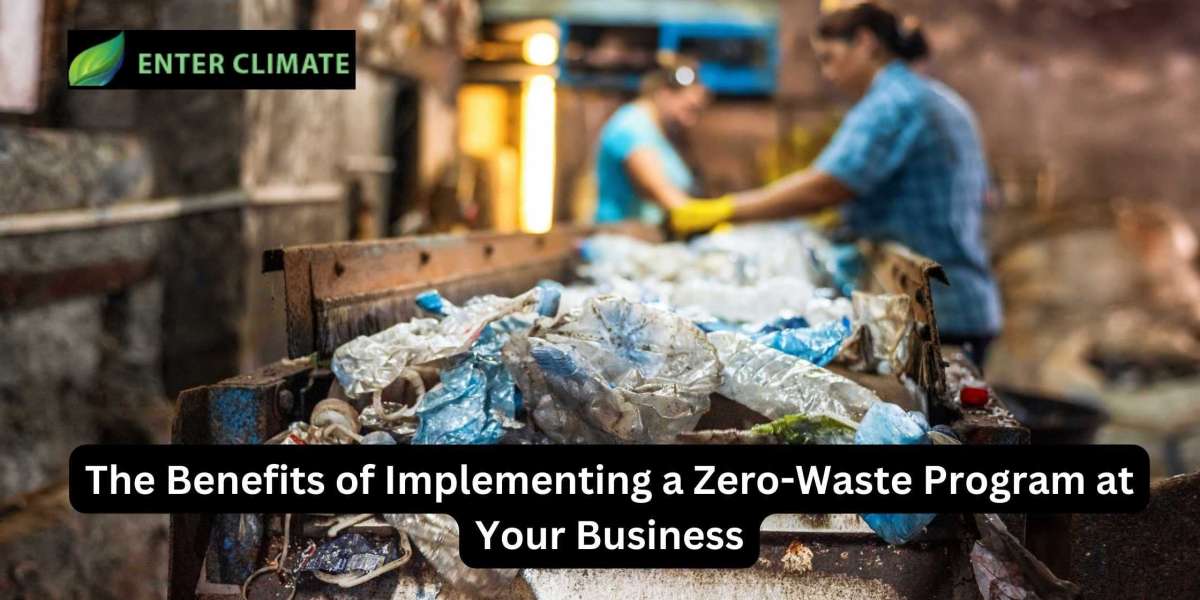In today’s world, where environmental concerns are becoming more pressing, businesses are under increasing pressure to adopt sustainable practices. One of the most impactful approaches is implementing a zero-waste program. Zero waste is not just a trend; it’s a transformative business strategy that can help companies reduce their environmental footprint while offering numerous financial and reputational benefits.
Zero-waste initiatives focus on reducing, reusing, and recycling waste, ultimately aiming to divert all waste from landfills and incineration. In the context of solid waste management, a zero-waste program involves creating systems and processes that prioritize the minimization of waste across every part of a business’s operations.
This blog will explore the numerous benefits of implementing a zero-waste program at your business, covering everything from cost savings to improved brand image, and offering insights into how such a program can be incorporated into your overall business strategy.
What is a Zero-Waste Program?
A zero-waste program is a comprehensive waste management strategy aimed at sending nothing to the landfill. It focuses on designing products and processes that reduce waste through efforts like recycling, reusing materials, and reducing consumption. The goal is to close the loop of product lifecycles through responsible consumption and production, turning waste into a resource.
This program goes beyond simply recycling and includes reducing waste at every stage of business operations—from product design and packaging to energy consumption and office waste.
Benefits of Implementing a Zero-Waste Program at Your Business
1. Cost Savings Through Waste Reduction
Implementing a zero-waste program can result in substantial cost savings for your business. By focusing on reducing waste and increasing recycling efforts, businesses can cut down on the costs associated with waste disposal.
- Waste diversion reduces the need for waste hauling services, which can be a significant expense for businesses, especially in areas where tipping fees for landfill disposal are high.
- Reduced material costs: By focusing on reusing materials and optimizing supply chains, businesses can reduce the need for purchasing new materials, lowering overall production costs.
As a result, a zero-waste program can lead to significant savings, especially for businesses with high-volume operations. The financial benefits of waste reduction can free up funds to reinvest in other areas of the business, contributing to overall business growth.
2. Improved Brand Image and Reputation
More consumers and investors are prioritizing sustainability, and businesses that implement zero-waste programs can leverage this to enhance their brand image and reputation. A commitment to reducing waste and minimizing environmental impact signals to customers that the company is responsible and forward-thinking.
- Consumer loyalty: Brands that prioritize sustainability often see increased customer loyalty, as many consumers prefer to support businesses that are committed to the environment.
- Differentiation: In a competitive market, a zero-waste program can help differentiate your business from others by showcasing your commitment to sustainability and social responsibility.
- Attracting top talent: Many employees, especially younger generations, are looking for companies that align with their values. A zero-waste program can attract environmentally conscious talent, further strengthening your workforce.
By making sustainability a core part of your business model, you build trust with your customers, employees, and the broader community, which can translate to long-term success.
3. Compliance with Environmental Regulations
As governments worldwide continue to tighten regulations on waste management and environmental impact, adopting a zero-waste program can help businesses stay ahead of regulatory requirements. Many jurisdictions have implemented or are planning to introduce stricter policies surrounding waste disposal, recycling, and carbon emissions.
A zero-waste initiative helps businesses comply with local, state, and even international environmental regulations, thus avoiding potential fines and reputational damage. It also demonstrates a proactive approach to environmental responsibility, positioning your business as a leader in sustainability.
4. Contributing to a Circular Economy
A zero-waste program aligns with the principles of a circular economy, where the goal is to reduce waste by reusing and recycling materials continuously. By adopting a circular economy approach, businesses contribute to a system where resources are kept in use for as long as possible, extracting maximum value before they are finally recycled into new products.
- Resource efficiency: Zero-waste practices ensure that resources are used efficiently and responsibly, which benefits the environment and minimizes waste generation.
- Reducing the need for virgin resources: By reusing materials and recycling products, businesses can reduce their reliance on raw materials, helping to reduce environmental degradation caused by resource extraction.
By implementing a zero-waste program, your business becomes an active participant in fostering a circular economy, reducing your overall environmental footprint.
5. Increased Employee Engagement and Morale
Employees want to work for businesses that take their environmental responsibilities seriously. By implementing a zero-waste program, you demonstrate your commitment to making a positive impact on the environment, which can boost employee morale.
Employees often take pride in knowing that their workplace is actively reducing waste and promoting sustainability. This sense of purpose can improve employee engagement and job satisfaction, fostering a positive work culture.
Additionally, by involving employees in waste reduction initiatives—such as waste audits, recycling programs, and sustainability training—you can encourage a sense of teamwork and shared responsibility. Employees can become advocates for the program, contributing to its success.
6. Innovation and Efficiency
A zero-waste program encourages innovation as businesses look for new ways to reduce, reuse, and recycle materials. This can lead to new product designs, smarter packaging solutions, and more efficient production processes that not only help reduce waste but also increase operational efficiency.
- Optimized resource use: Reducing waste forces businesses to reevaluate their processes and find ways to use resources more effectively, which can lead to improved productivity and cost savings.
- Product and process innovation: Implementing a zero-waste program might inspire innovative product designs, such as modular products or packaging that can be easily reused or recycled.
By embracing innovation, your business can stay ahead of industry trends and discover new ways to minimize waste while enhancing overall performance.
How to Implement a Zero-Waste Program at Your Business
To get started with a zero-waste program, businesses need to assess their current waste management practices and identify areas for improvement. Here are a few steps to implement a successful zero-waste program:
- Conduct a Waste Audit: Start by evaluating the waste your business generates. Identify areas where waste can be reduced, reused, or recycled.
- Set Clear Goals: Define the goals of your zero-waste program. Do you aim to eliminate single-use plastics? Or are you focused on achieving a specific waste diversion rate?
- Engage Employees: Involve employees in the process by providing training and encouraging participation. Employee buy-in is crucial to the success of the program.
- Collaborate with Suppliers: Work with suppliers to reduce packaging waste and select sustainable materials.
- Track and Measure Progress: Monitor your progress regularly and make adjustments as needed. Reporting on successes and challenges will help maintain momentum and improve future efforts.
Conclusion
Implementing a zero-waste program offers a wide range of benefits for businesses, from reducing costs and improving sustainability to enhancing brand reputation and employee morale. By focusing on waste reduction, reusing materials, and embracing recycling, companies can make a significant positive impact on the environment while positioning themselves as leaders in sustainability.
Incorporating a zero-waste program into your business strategy isn’t just good for the planet—it’s good for your bottom line, too. As more businesses embrace zero-waste practices, the transition to a more sustainable, circular economy becomes inevitable.
FAQs
1. What is a zero-waste program?
A zero-waste program is a waste management strategy that focuses on reducing, reusing, and recycling materials to prevent waste from being sent to landfills or incineration. The goal is to create a closed-loop system where all materials are continually reused and recycled.
2. How does a zero-waste program benefit a business financially?
A zero-waste program can reduce waste disposal costs, lower material expenses by promoting recycling and reusing, and increase efficiency. These savings can lead to significant financial benefits, allowing businesses to reinvest in other areas.
3. Can a zero-waste program improve a company’s reputation?
Yes, businesses that adopt zero-waste programs demonstrate a commitment to sustainability, which can enhance their brand image, attract environmentally conscious consumers, and improve employee morale.


